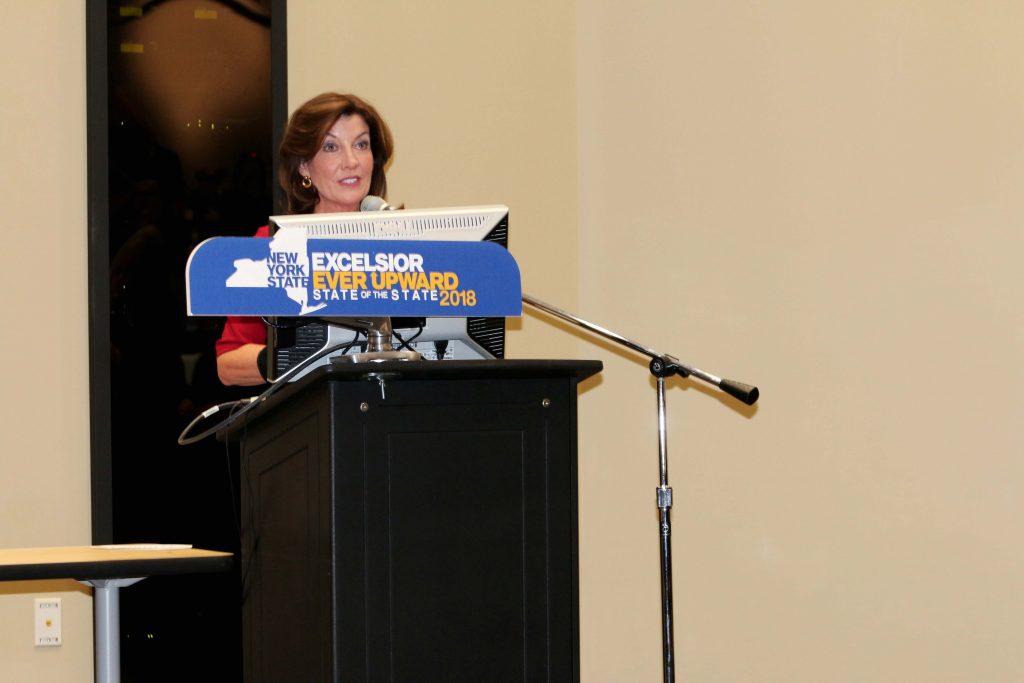
New York State Lt. Gov. Kathy Hochul visited Binghamton University on Thursday to deliver a condensed version of Gov. Andrew Cuomo’s state of the state address, focusing on initiatives relating to the University and the Southern Tier, including the expansion of the Excelsior Scholarship.
The family income cap for the award will be raised to $110,000 in 2018-2019, and 27,000 SUNY and CUNY students are expected to qualify for free tuition. In 2017-2018, 23,000 students qualified for the award, and 53 percent of students received free tuition at SUNY and CUNY schools. The cap is set to rise for the last time next year, when students whose families make less than $125,000 per year will be eligible.
“I’m so proud to live in a state where our public institutions are second to none and we are at the premiere institution here in New York, Binghamton University,” Hochul said to the 100 people gathered in the Innovative Technologies Complex Symposium Hall. “Binghamton University is a huge point of pride for us and to know that because of the governor’s initiative, that it’ll be more affordable.”
Cuomo’s address, delivered Wednesday in Albany, proposed several initiatives focused on combating student debt, including requiring colleges to provide students with accurate loan estimates and creating a Student Loan Ombudsman to serve as an advocate for student borrowers.
“[Students] did everything they’re asked to do: you work hard, you succeed, you get into school and all of a sudden, you have this albatross around your neck known as student debt,” Hochul said. “We have a whole generation of young people who now have to deal with this every day.”
In 2016, the average debt for BU graduates was $25,718, according to The Institute for College Success & Access, a nonprofit organization dedicated to making higher education more accessible. Fifty percent of BU students graduated with some debt.
In his state of the state report, Cuomo promised to propose a bill that would make it illegal for state agencies to suspend the licenses of professionals who are behind on their student loans.
“This practice severely limits the ability of people to support themselves and their families, and to ultimately pay back their student loans,” the report reads.
University President Harvey Stenger, called the governor’s goals ambitious, but said they could be achieved if people work together.
“I agree with [Governor Cuomo] when he said we’re big and great; we are [the] best state in US and we can do great things,” Stenger said.
Hochul echoed Stenger’s sentiment, and said that New York is a leader in the United States.
“The governor’s vision is bold, but it’s a reminder about where we’ve come from and our responsibility to the rest of the nation as the place where so many movements have started,” she said.
Hochul, who chairs the state’s Women’s Suffrage 100th Anniversary Commemoration Commission, reminded the audience that the first woman who voted in the state did so in Broome County in 1917.
“Having more women in positions of power, whether it’s in the boardrooms or whether it’s in our halls of power in Washington and New York state is an important dynamic,” Hochul said.
Hochul also chairs the state’s Regional Economic Development Councils, 10 bodies tasked with recommending which projects in their area are most deserving of state funding. In 2015, the Southern Tier Regional Economic Development Council was awarded $500 million through the state’s upstate revitalization initiative.
Hochul said the state’s investment in the region has continued, pointing to the $650,000 committed last month to the construction of processing lines for hemp products in the City of Binghamton. This summer, Cuomo signed legislation that classifies hemp as part of the agriculture industry.
“I like to see how the Southern Tier has reimagined itself, shifting away from the manufacturing industry,” Hochul said.
Hochul’s visit to BU was the first in a series of appearances she’ll be making to deliver abbreviated versions of the address. On Friday, Jan. 5 she’s scheduled to visit Dunkirk in Chautauqua County before heading to Genesee Community College in Batavia, New York. The governor’s state of the state address precedes the unveiling of executive budget proposal, slated for Jan. 16. The final budget, which must be passed by both chambers of the state legislature, is due April 1.


